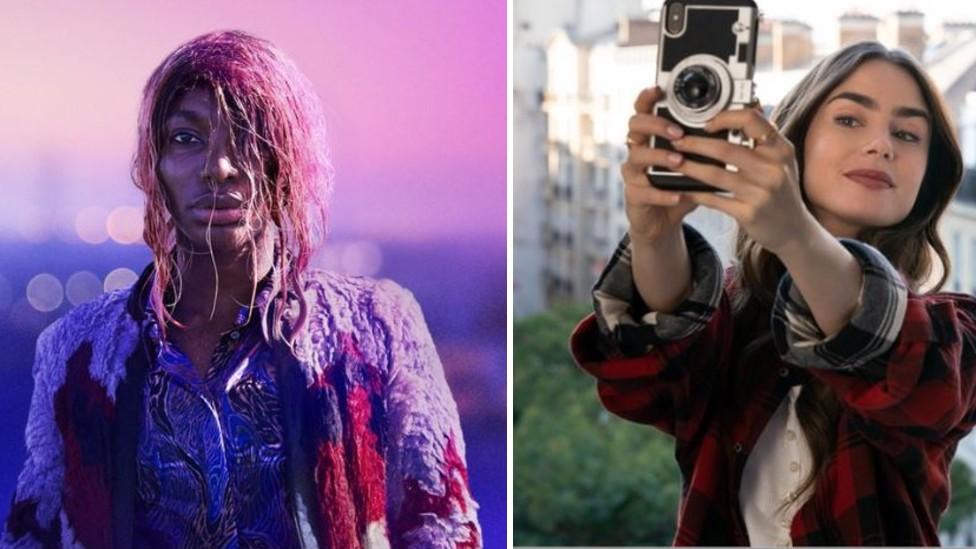Bafta TV Awards honour multi-talented Michaela Coel for I May Destroy You
- Published
Watch what happened at the Bafta TV Awards
Michaela Coel has been named best actress at the Bafta TV Awards, after also winning Baftas for writing and directing her drama I May Destroy You.
Coel picked up the best actress prize as well as best mini-series at the Bafta TV ceremony in London on Sunday.
It came two weeks after she won writing and directing prizes at the Bafta Craft Awards, which reward backstage talent.
Sunday's other winners included Normal People's Paul Mescal, who was named best actor, and dance group Diversity.
The troupe won the "must-see moment" award for their controversial Britain's Got Talent routine, which reflected the killing of George Floyd and the Black Lives Matter movement.
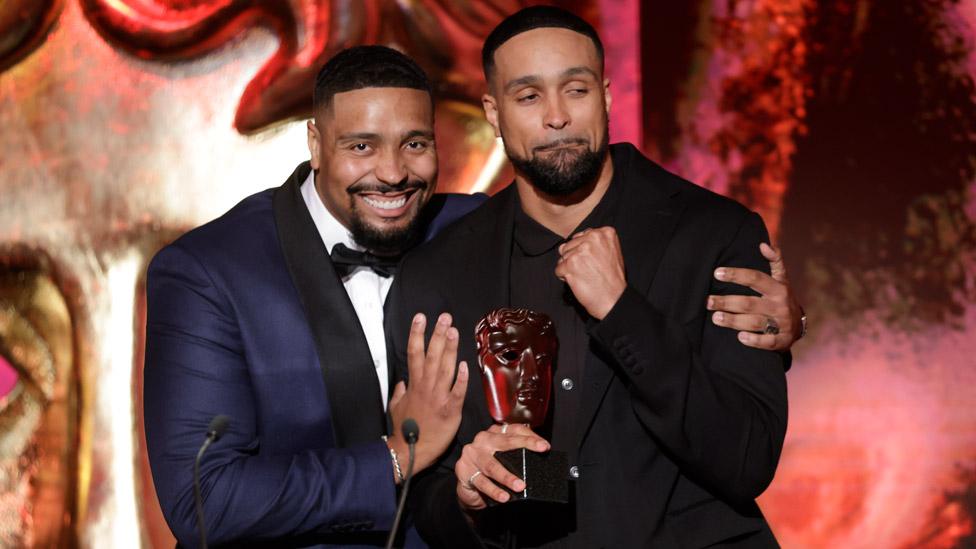
Ashley Banjo (right, with brother Jordan) said "this is what change looks like"
The routine was aired in September and made BGT the most complained-about TV show of 2020 - but Diversity have now received a show of support by winning the night's only category to be voted for by the public.
Ashley Banjo said it was "so much more than just an award". The period after the broadcast was "a really dark time, being in the storm of 30,000 complaints, just a torrent of like racially charged abuse threats", he told the Bafta audience.
He added: "This is what change looks like... So thank you all so, so much. Let's keep having difficult conversations. Let's keep standing up for what's right, regardless of the colour of our skin and we will achieve that equality."
Comedian Richard Ayoade hosted the event, with some nominees attending the socially-distanced ceremony in person, while others accepted their awards remotely.
Coel was honoured for creating, writing, directing, starring in and executive producing I May Destroy You.
The 12-part drama about a woman attempting to remember and come to terms with a sexual assault was inspired by something that happened to Coel herself.
She dedicated the best mini-series award to the show's crew, who were "the unsung heroes who create everything you see, hear and feel".
Intimacy co-ordinators 'essential'
She then dedicated her acting prize to the show's intimacy co-ordinator Ita O'Brien, who she said allowed people in the industry to "make work about exploitation, loss of respect, about abuse of power, without being exploited or abused in the process".
Intimacy director advises BBC drama about shooting sex scenes
Coel said: "I know what it's like to shoot without an intimacy director - the messy, embarrassing feeling for the crew, the internal devastation for the actor." Using such co-ordinators is "essential for every production company that wants to make work exploring themes of consent", she added.
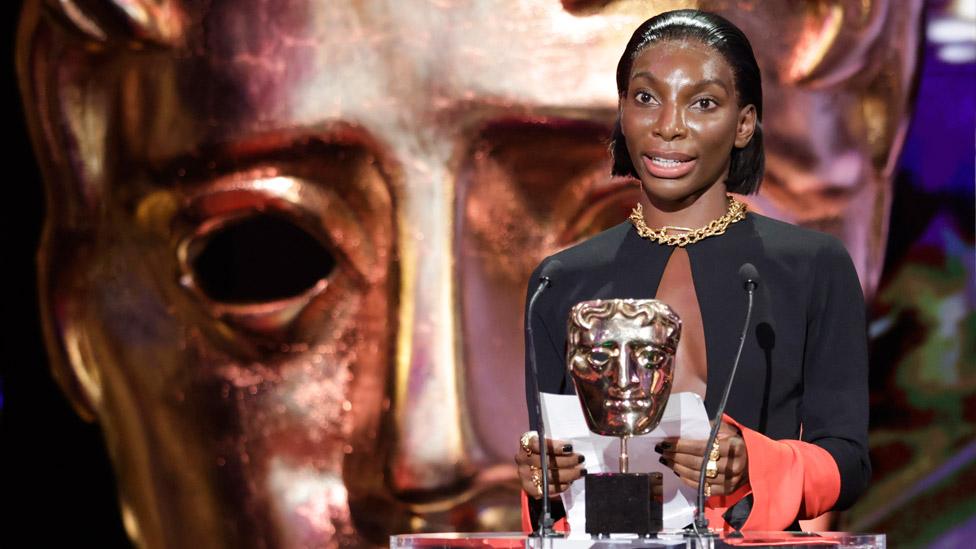
Michaela Coel has won Baftas for starring in, writing and directing I May Destroy You
Coel triumphed over an impressive best actress shortlist that also included Killing Eve's Jodie Comer, Small Axe's Letitia Wright, I Hate Suzie's Billie Piper, Adult Material's Hayley Squires and Normal People's Daisy Edgar-Jones.
Edgar-Jones' co-star Mescal said he was "incredibly nervous" as he accepted the best actor trophy, after beating fellow nominees including I May Destroy You's Paapa Essiedu, The Crown's Josh O'Connor and Small Axe's John Boyega.
Small Axe, director Sir Steve McQueen's landmark series, led the nominations and took one prize on the night - best supporting actor for Malachi Kirby, who played civil rights activist Darcus Howe in the instalment titled Mangrove.
"Thank you for your fight, and everyone else who stood with him," Kirby said.
A number of other real-life black British stories were also honoured by Bafta.
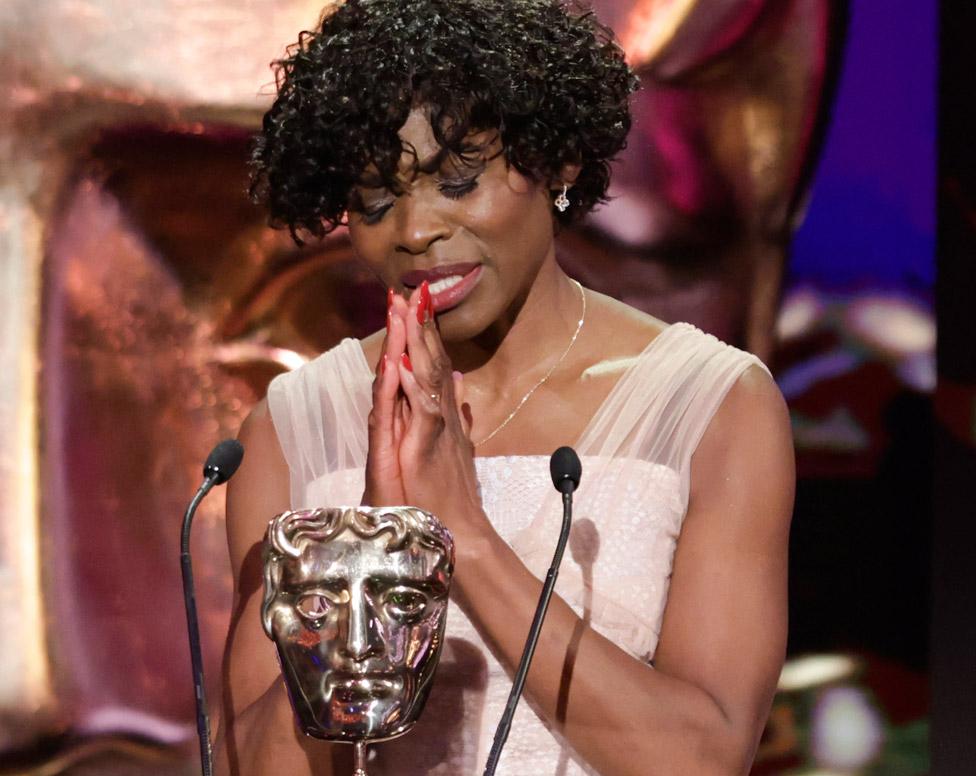
Rakie Ayola won best supporting actress for playing Gee Walker in Jimmy McGovern's Anthony
Rakie Ayola won best supporting actress for her role in the one-off drama Anthony as the mother of Anthony Walker, who was murdered in a racist attack at the age of 18 in 2005.
She thanked Gee Walker "for having the bravery and the strength to ask Jimmy McGovern to write your son's story and to celebrate the person that Anthony Walker should have been and never was".
The trophy for best single drama went to Sitting In Limbo, which told the story of the Windrush scandal through the eyes of Anthony Bryan, who had lived and worked in the UK for 50 years before being detained and almost deported.
It was written by Bryan's younger brother Stephen S Thompson, who told the Bafta ceremony: "I'd like to dedicate this award to all the victims of the Windrush scandal. This is our way of saying that we see you, we hear you and we honour you."
Meanwhile, Sky Atlantic's Save Me Too, which stars Lennie James and Suranne Jones, beat The Crown, I Hate Suzie and Gangs of London to the prize for best drama series.

Life & Rhymes beat some big names to win best entertainment programme
Sky Arts' spoken word series Life & Rhymes was the surprise winner of the best entertainment programme award, beating heavyweights Strictly Come Dancing, Ant & Dec's Saturday Night Takeaway and The Masked Singer.
"We gave voice to a community that needed to be heard," Life & Rhymes host and poet Benjamin Zephaniah told the ceremony.
The other winners included The Big Narstie Show, which won best comedy entertainment programme, and Romesh Ranganathan, who beat the likes of Graham Norton, Claudia Winkleman and Bradley Walsh to the prize for best entertainment performance for The Ranganation.
Inside No 9 won best scripted comedy, while Charlie Cooper won best male comedy performance for This Country and Aimee Lou Wood won the female equivalent for Sex Education.

Years and Years' Olly Alexander opened the ceremony
Casualty took the soap and continuing drama award, Once Upon A Time In Iraq won best factual series, and Long Lost Family: Born Without A Trace took the factual prize.
No special awards or fellowships were handed out this year because Bafta is currently reviewing the processes that govern their presentation.
The organisation was criticised for giving Noel Clarke an outstanding contribution award in April despite being aware of sexual harassment claims against him, claims the actor denies.
The British Academy of Film and Television Arts was formed in 1947 and has been presenting awards for television since 1954.

HAVE YOU SEEN THE UNMISSABLE I MAY DESTROY YOU?: Watch it and all the other BBC BAFTA winners on BBC iPlayer


Follow us on Facebook, external, or on Twitter @BBCNewsEnts, external. If you have a story suggestion email entertainment.news@bbc.co.uk, external.
Related topics
- Published6 June 2021
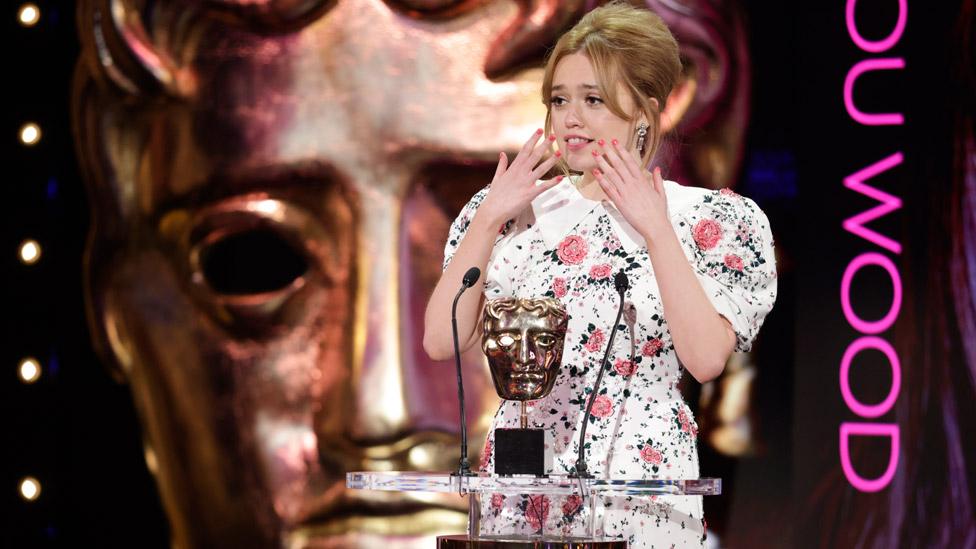
- Published6 June 2021

- Published6 June 2021

- Published1 June 2021

- Published4 February 2021
